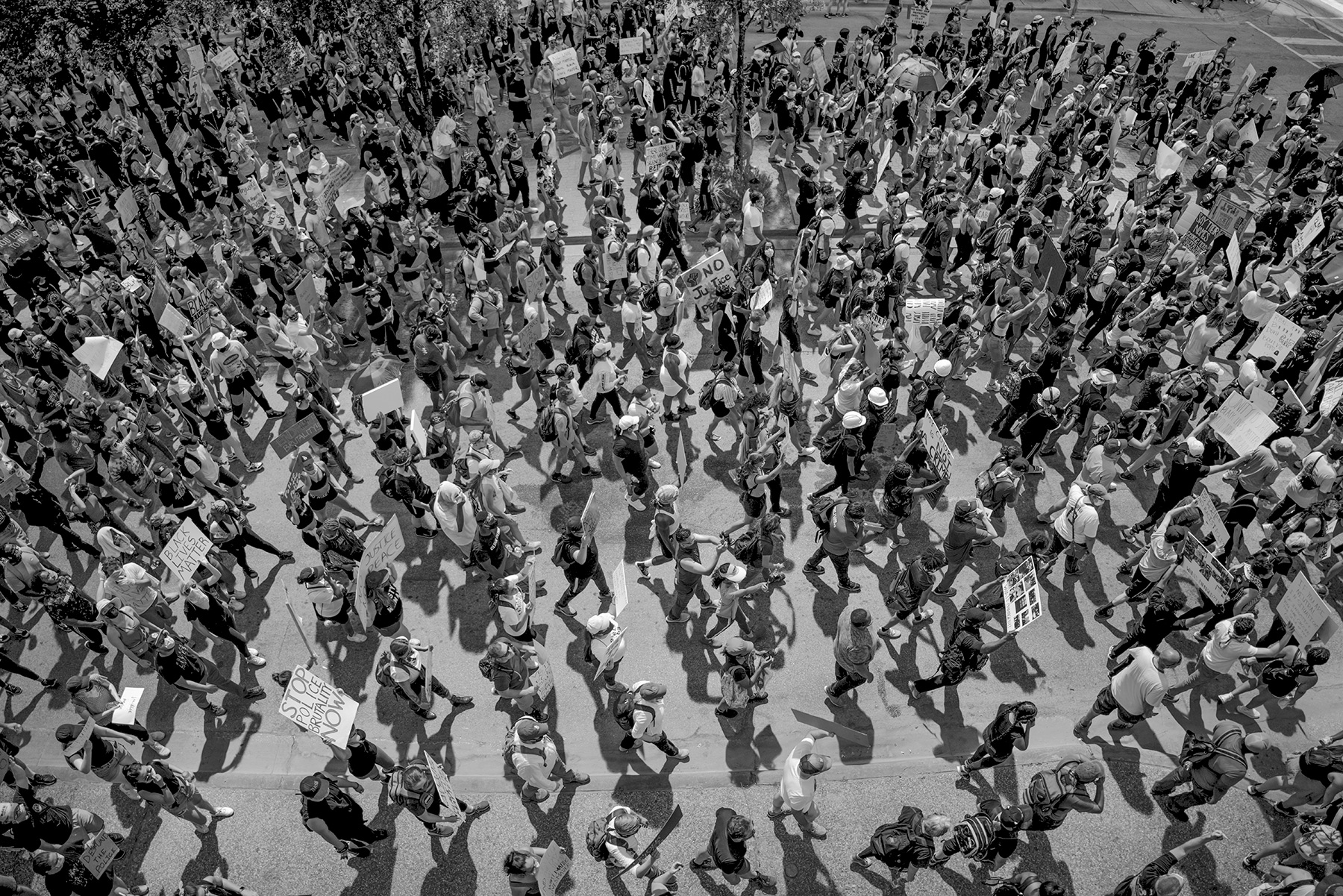Five years ago this month, President Barack Obama flew to Dallas after a lone gunman had opened fire during a protest march against police brutality, killing five officers and wounding nine others. Speaking to mourners at the Morton H. Meyerson Symphony Center, the president addressed the anger, pain, and confusion that hung like a haze over this city.
“Faced with this violence, we wonder if the divides of race in America can ever be bridged,” the president said. “We wonder if an African American community that feels unfairly targeted by police, and police departments that feel unfairly maligned for doing their jobs, can ever understand each other’s experience.”
Five years later, we still wonder. Since that terrible day, the city and the nation have witnessed what feels like a relentless barrage of violence. In North Texas, police officers have shot and killed Jordan Edwards, Botham Jean, and Atatiana Jefferson. Last summer, the murder of George Floyd by a police officer in Minneapolis prompted some of the largest mass demonstrations in Dallas’ history; cops responded with tear gas and “less lethal” foam bullets.
Back in 2016, days after the gunman had infiltrated an otherwise peaceful march through downtown, I wrote in an essay in D Magazine saying that I feared the shooting would subvert the message of the protesters, that many would equate the murderous rampage with the righteous anger represented by the marchers in the streets. Five years later, that dark night in Dallas history still seems to loom over the movement, and so I went looking to see how activists’ efforts to reform policing in Dallas have continued to be shaped by the events of July 7.
I caught up with Dominique Alexander, who organized that march, on a rainy Monday night in May, at South Oak Cliff High School. Alexander is a minister, activist, and founder of the Next Generation Action Network, which has organized many of the largest marches in Dallas over the last five years. He is a controversial figure and an imperfect face of the movement (in 2019, he was indicted on family violence charges that were later dismissed). But Alexander has experienced firsthand how the July 7 killings have come to define the broader protest movement.
“That day brings great trauma to me because I get blamed for some of the most horrible things with regards to that,” Alexander told me.
Walking into South Oak Cliff High School’s new annex offers its own witness to the power of Alexander’s protests. Dallas ISD invested $52 million in the school after Alexander helped stage a walkout in 2015 over the deplorable condition of the old building. Alexander chose the setting to kick off the NGAN’s George Floyd commemoration week. About a dozen or so people trickled into the auditorium where a couple of cameras were set up to stream a live feed.
As the event began, Senior Corporal Terrance Hopkins, the president of the Dallas Black Police Association and a 30-year veteran of the Dallas Police Department, joined Alexander on stage for a friendly, if somewhat cagey, exchange. The two attempted to find common ground for activists and police. Then Alexander invited sisters of three victims of police violence to join him. They discussed what it was like for families whose loved ones have been killed by police to endure suffering while feeling driven toward activism.
Those assembled on stage presented an uncommon juxtaposition: the policeman and the police victims. Unlike last summer’s protests, the event was subdued and made only a handful of local newscasts. In his remarks, Alexander said that was the point. He wanted to show that reformers were willing to engage in productive dialogue with police, while also reminding people that their activism was driven by the real pain and anguish experienced by families destroyed by police shootings.
“Normally, we are at a protest or in the council chamber,” Alexander said. “Most of the time, we don’t just talk.”
It struck me as a significant shift in strategy. Over the past five years, the protest movement has made only limited political gains. The city launched an Office of Community Police Oversight, created a new online complaint system, and piloted a program that dispatches healthcare professionals to some 911 calls—exactly the kind of policy championed by advocates. But what hasn’t happened, Alexander says, is a deeper reckoning with policing culture.
“At the end of the day, every other profession has more structure and accountability,” Alexander later told me on the phone. “When a surgeon does something wrong on the table, do people say, ‘Support a doctor’? No. If he has done anything wrong, he is going to lose his license.”
Sara Mokuria, co-founder of the local group Mothers Against Police Brutality, believes that this resistance to meaningful cultural change within police departments calcified in the aftermath of July 7. “So much has changed since then,” Mokuria says when I put the same questions to her that I asked Alexander. “Yes, we’re in a new place. But tragically, also, the context is still all too familiar. The solutions that politicians, from local to federal, are offering are like stuck on a hamster wheel.”
Since 2016, support for police reform has grown, but so has a fiercely protective attitude around law enforcement. Earlier this year, Dallas council members who voted for a small cut to the police department’s overtime budget were branded during reelection campaigns as supporters of the “defund” movement, even though the overall police budget they voted for increased in 2020. During its latest session, the Texas State Legislature passed laws that limit local governments’ ability to cut their police budgets and hamper teachers from discussing the racist history of our country.
Mokuria sees these moves as a direct legacy of July 7, which reframed the protest movement as an assault on policing. “You saw this narrative develop around further criminalizing Black folks and Black resistance,” she says. “That moment also helped to strengthen the narrative of police officers as an identity that needs to be protected.”
As activism around police reform has been subsumed by a culture war, it has obfuscated what lies ahead: an unprecedented public policy challenge.
That’s what Ronald Davis, a former police chief and Justice Department official who served as the executive director of President Obama’s Task Force on 21st Century Policing, told the Brennan Center for Justice in 2020: “We’re going to have to dismantle this thing all the way to the ground and rebuild it. The challenge, however, is that we have to do it while we are still flying the plane—because we do not have the ability to just stop police services and rebuild.”
We also don’t have a clear idea of what rebuilt policing would look like. Jennifer Doleac, director of the Justice Tech Lab at Texas A&M University, argues in a report for the Niskanen Center, a public policy institute, that there has been insufficient field research analyzing the effectiveness of reforms like increasing diverse representation within police departments, overhauling training, and improving accountability.
“The tragic, unavoidable fact is that we simply do not know nearly enough about how to actually reduce abusive, racially motivated policing,” Doleac writes.
That has left many activists caught in the same wondering limbo President Obama described five years ago. In an attempt to find common ground at South Oak Cliff High, Alexander dampened the tone of some of the movement’s demands. When protesters called for a “defunding” of the police, he said, that didn’t mean they wanted to “burn the whole house down.” Hopkins admitted that a lot of police officers blame Alexander and the protesters for what happened on July 7. “It carved a big rift,” he said.
Hopkins’ comments underscore how difficult it is to get the department onboard with substantive changes. But the shooting had little to do with the activism seeking to end police violence. The gunman was a mentally ill veteran. Truth is, the events of that night have never neatly fit the ready narrative of either side of the policing debate. The march itself was peaceful. Police officers posed for photos with protesters to demonstrate solidarity. When downtown became a war zone, officers put their lives on the line to save protesters, and afterward the city united in grief. The day began as a call to recognize the racism that divides our society. It turned into a bloody mess. Which is to say: it was in some ways a typical day in America.
That’s what often gets lost in the conversations around July 7. We lose sight of the fact that the violence on that day was not an anomaly. And that violence numbs us to the message of the protests that have swept our streets over the past five years. In communities across our city and country, July 7 comes every day.
Write to [email protected]. This story originally appeared in the July issue of D Magazine with the title “Walk the Line.”






